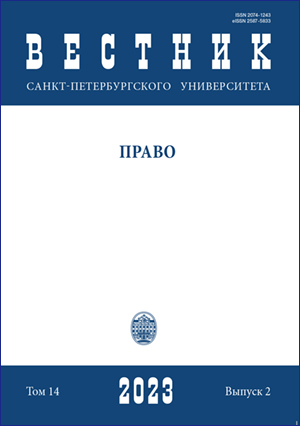The civil process: Forms of thinking in the framework of the issuance of judicial acts
DOI:
https://doi.org/10.21638/spbu14.2023.205Abstract
The article analyzes the problems associated with the logical content of judicial acts in civil and arbitration proceedings. In this case, the problems of application of such forms of thinking as concept, judgment and inference within the framework of the content of judicial acts are considered in the most detail. Special attention is paid to the use of evaluative concepts by courts, as well as to their formulation of syllogisms as a special form of inference. The purpose of the study is to establish the specifics of the application of the main forms of thinking when passing judicial acts in civil law proceedings. To achieve this goal, the author has set the task of analyzing each of the forms of thinking from the point of view of procedural legislation and legal technique in terms of formulating the texts of judicial acts. Also, the author has set the task of classifying approaches to the use of syllogisms by courts in the framework of decisions in the case. In the present study, methods such as the logical method, as well as the system structural, hermeneutic and formal legal methods were applied. The application of the above methods made it possible to fully achieve the goals and objectives of the study, formulate scientifically grounded conclusions. The author, based on the results of the study, revealed the peculiarities of the formulation and application of concepts, judgments and conclusions in the text of judicial acts issued in the course of civil and arbitration proceedings. The mechanisms of establishment by the court of the content and scope of concepts that are not enshrined in law, as well as evaluative concepts, have been identified. In addition, the author has classified the approaches to the use of syllogisms by courts in the framework of decisions in the case. The author also proposed changes in terms of improving the norms of the current procedural legislation aimed at specifying the requirements for judicial decisions.
Keywords:
court, judicial act, court decision, validity, motivation, judicial discretion, syllogism
Downloads
References
Downloads
Published
How to Cite
Issue
Section
License
Articles of "Vestnik of Saint Petersburg University. Law" are open access distributed under the terms of the License Agreement with Saint Petersburg State University, which permits to the authors unrestricted distribution and self-archiving free of charge.






